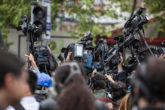
Government through the Ministry of Ethics and Integrity headed by Father Lokodo is proposing to introduce the Religious and Faith Based Organisation (RFBO) policy, but most of the Faith Based Organisations (FBO) have rejected this policy because of the foreseen dangers. This article is intend to sound warning bells taking a lesson from the dangers of religious policies in other countries.
Many countries have attempted to regulate FBO which mainly include: Born Again Churches, Moslems, Catholics, Anglicans, Orthodox, and Seventh Day Adventists, but the attempts to regulate have caused more animosity and conflict than harmony between the FBO and the state. Research shows that most government laws and restrictions range from a constitution’s stated commitment to religious freedom (or lack thereof) to the regulation or registration of religious groups.
Countries in the Middle East and North Africa have higher levels of these restrictions, the same trend is rapidly sweeping over sub-Saharan Africa, which experienced a sharp rise in government laws and policies restricting religious freedom between 2014 and 2017. As a result the stringent rules developed by governments have made it practically impossible for any FBO to be registered based on the government’s criteria.
Research has shown that through the mandatory government registration criteria for religious groups to operate, at least eight-in-ten countries in America and more than half the countries in sub-Saharan Africa, the Asia-Pacific region and Europe, Middle East and North Africa had a registration process in 2017, which adversely affected the ability of many groups to carry out their religious activities.
Research has also shown that in some cases, governments recognize only a specific set of religious groups and deny registration or official recognition to all others. Using bureaucratic barriers governments create cumbersome registration processes that disadvantage particular groups. “For example, in Eritrea, the government recognizes and registers only four religious groups — the Eritrean Orthodox Church, Sunni Islam, the Roman Catholic Church and the Evangelical Lutheran Church of Eritrea — and since 2002 no other groups have been registered or allowed to perform religious activities and services.”
The religious policies in China, Saudi Arabia are so terrible. This will be a discussion for another day. In America, an attempt to separate the church and the state led to religious values being kicked out of public schools. The children in those schools can be allowed to listen to any advocacy of every system of thought a part from anything called religious. So all public education is restricted to secular viewpoints only. This has also affected public presentation of Christianity but has allowed presentations on witchcraft and other Eastern mysticism religions.
One of the reasons why Christianity has received a lot of harassment, is because it is the only genuine voice that stands against the evils created by sinful man. Research has also revealed that in many countries the unfair and restrictive religious policies have tremendously affected religious freedoms and this has opened doors to an enormous increase in divorce, abortion, single parent families, drugs, gangs, crime rates, AIDS among others because these government religious polices create messianic states, which claim all authority and seek to solve all religious problems instead make things worse.
In all the countries where these religious policies have been introduced government has limited activities of religious groups and individuals ranging from dress code, public or private worship, religious literature among others. This has been every evident in Europe where prohibitions on putting on religious symbols and wear in photographs for official documents and when holding a public service job. Studies show that European governments that have interfered with religious forms of worship and practices have increased since 2007. In Moldova, for example, several local councils in 2012 banned Muslim worship in public.
The studies also show that in 2017, 18 out of 20 countries in the Middle East and North Africa stopped public preaching also known as crusade evangelism, this definitely affects church growth. In other countries through these restrictive religious polices for example in Jordan the government monitored sermons preached and further gave themes and recommended texts to be preached from by the religious groups, those that did not comply were subjected to fines or preaching bans.
This kind of trend is rapidly increasing in sub-Saharan African, countries such as Cameroon, Chad, the Republic of Congo and Niger — banned Islamic veils for women. When Rwanda introduced this restrictive religious policy in a week over 700 churches and some mosques were closed down and some religious leaders imprisoned. I have not come across any data that suggest a successful religious policy in any country that has stamped out the moral issues that the policies seek to address.
The supporters of the RFBO policy in Uganda should know that when they support this policy they are giving a blank cheque to the above dangers and many more to freely enter our country. The RFBO policy is like a doctor administering wrong medicine for a wrong diagnosis.
joseph.magongo@gmail.com
The writer is a pastor and member of the National Fellowship of Born Again Pentecostal Churches of Uganda (NFPBC)

